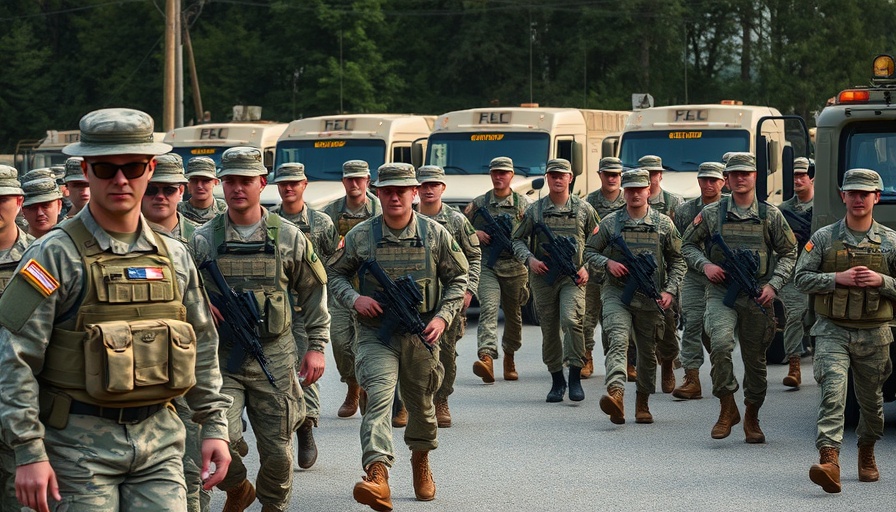
Trump’s Decision to Deploy National Guard: Unpacking the Controversy
In a decisive and contentious move, President Donald Trump has ordered the deployment of 500 National Guard troops to the Chicago area to protect federal facilities. This action comes amidst a backdrop of fierce protests and strong opposition from local leaders, who argue that such a deployment is unconstitutional. The clash of opinions highlights a critical legal and ethical debate about the use of the National Guard, the powers of the presidency, and the rights of citizens to peacefully protest.
In Trump's use of the National Guard faces critical legal tests, the discussion dives into the implications of federal intervention in local matters, exploring key insights that sparked deeper analysis on our end.
The Unfolding Reaction from Local Authorities
Local officials are rallying against the federal decision, with the Governor of Illinois, the state Attorney General, and Chicago's Mayor all voicing their indignation. They claim that deploying the National Guard without the consent of local authorities undermines democratic principles and sets a dangerous precedent for federal overreach. The protests that erupted on the streets following the announcement reflect the community's deep-rooted concerns about government power and civil liberties.
A Legal Battle on the Horizon
A legal battle is brewing as the situation evolves. A judge is expected to assess the constitutionality of Trump's decision, weighing the balance of power between state and federal authorities. This case could potentially redefine the parameters within which the National Guard operates, especially concerning civil unrest and local governance. It raises essential questions: How far can a president go in using military resources to quell domestic unrest? Where does state sovereignty begin and federal authority end?
Historical Context: The Use of National Guard in Civil Unrest
The National Guard has historically been called upon during periods of national crisis, from natural disasters to civil unrest. However, the context and motivations behind these deployments have always varied significantly. For instance, during the Civil Rights Movement in the 1960s, the National Guard was used to enforce desegregation mandates in southern states against public opposition. Analyzing these historical precedents can provide valuable insights into the potential ramifications of current actions by the federal government.
The Emotional Ramifications for Citizens
For many Chicago residents, the presence of armed National Guard troops can induce feelings of fear and vulnerability. It's not just about the troops; it's a symbol of the larger tensions between community desires for peace and security versus the perceived threat of federal encroachment. Residents have taken to the streets not just to express their opposition to Trump’s order but also to advocate for their right to protest and speak out against injustices they believe require attention.
Counterarguments: Support for the Deployment
Despite the widespread opposition, some argue that federal intervention is necessary to maintain order in a volatile environment. Supporters of the National Guard's presence cite the recent uptick in violence and civil disorder as justified reasons for federal oversight. They contend that without such measures, more destruction could ensue, jeopardizing both public safety and property. It’s a complex issue that invites further examination of the motives behind both support and opposition.
Future Implications: What Lies Ahead?
As this situation unfolds, the implications for future presidential powers and the role of the National Guard could be far-reaching. Should the courts uphold Trump’s decision, it may set a new standard for how presidents can utilize military resources in domestic matters. Conversely, a ruling against the deployment could empower local leaders and reinforce the principle of state sovereignty. This ongoing situation invites all citizens to consider what type of governance they want to support and where their lines of accountability lie.
Empowering Citizens Through Awareness
Awareness of these unfolding events is crucial for Pennsylvania residents and beyond. By staying informed, individuals can engage more effectively in civic discourse, voicing their opinions to legislators and participating in the democratic process. Understanding the historical context and the legal battles over the National Guard can equip citizens with the knowledge they need to advocate for their rights and influence change.
As the debate over Trump’s order continues to escalate, it has never been more important for citizens to engage in the discussions that shape their communities and the nation at large. By actively participating, residents of Pennsylvania can ensure their voices are heard, and their rights protected.
 Add Row
Add Row  Add
Add 




Write A Comment